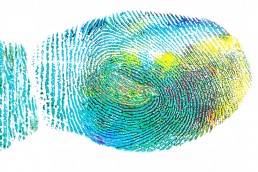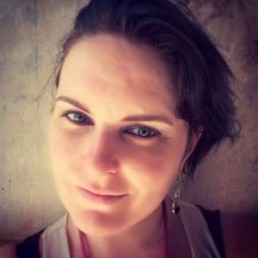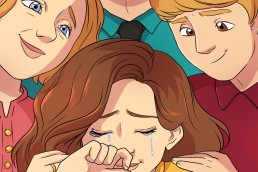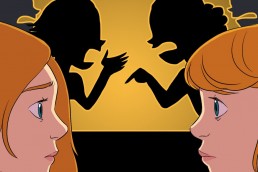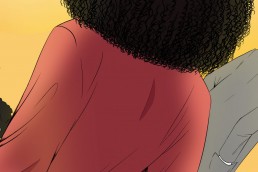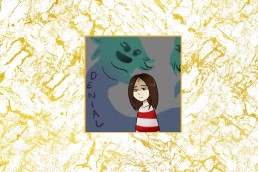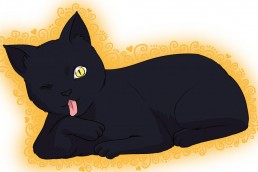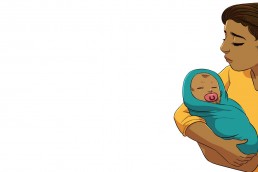by Mairi Campbell-Jack
Content Warning: mentions of physical abuse
Violence skimmed across my family like a stone. It never settled for long, but enough to move the surface, to cause ripples that spread out far ahead and behind. The first time I remember, my father stripped me from the waist down and lay me across a high stool like an alter. My siblings and my mother, who had encouraged him, watched as he took a wooden spoon and hit me repeatedly. I was not above six. I was ritualistically humiliated with physical punishment because I wasn’t eating the food my mother had prepared.
The second time I can remember, a few years later, was also at meal time. My mother twisted my arm behind my back immobilising me, and threw a knife at the kitchen door. My siblings and I were marched to my father’s study. He refused to allow us to leave until we wrote letters of apology to my mother. I can’t remember what for. Faced with two people who provided us with food, shelter, and without whom we did not know how to live, we capitulated. We admitted it was us who were to blame for my mother’s volatility.
The last time I remember, I was in double figures. We were on holiday. My mother was in a bad mood. She could descend into silence abruptly, and for hours. Cutting us off, not looking at us – it was as though her family had ceased to exist. This time we were leaving church and something during the sermon had pushed her into a dark mood. As I got into the car she shut the door on my ankle.
It wasn’t bone shattering. I didn’t have skin hanging from my leg. No blood dripped thickly from me. It hurt. It swelled. I spent the journey gulping down sobs. No one said anything. No one could ever say anything when my mother was shut down. I went uncomforted while surrounded by family.
None of the pain is what we like to associate with abuse. Marks that are obvious, easy to point at and define. Loud like a split lip, unsightly like a black eye. It was quiet violence that like wind or water eroding rock, shaped me. The blaming look of deep disappointment or disapproval. The guilt. The shame. The loud vocal criticism of each child to their siblings and their face. The pressure to perform in a way my parents could boast about. The minimising of pain. The constant expectation of perfection
“Everyone should try to be like Jesus. He was perfect.”
The admonishment each year that all my mother wanted for her birthday was “good children.”
The way our parents forbade us from having the experiences our peers did. We were purposely kept apart, different, theirs. As I grew older there were digs at my body maturing, attempts to keep me like a child, innocent, malleable, easily manipulated.
I left home. I couldn’t deal with the maelstrom of thoughts and feelings. I had never been allowed to have emotions that were not sanctioned by my mother. I tried drinking, but they could not be drowned. I tried to smoke them out, but they had no need for oxygen. I tried to starve them, but they just turned and started eating me. I tried not to feel, but I’m covered in skin, so I tried to cut, but my heart wasn’t in it.
I thought I could be loved out of myself. I searched for another heart, but could only attract one as dented, bruised and broken as mine. When we twinned together we became toxic, amplifying each other’s worst fears, burying and suffocating each other, I was trauma bonded.
Then the bruises blossomed around me. Small ovals, like a thumb print, a fingerprint. At my ankles, on my upper arm. No matter how many times I asked him to be gentler, he couldn’t remember not to hurt me. The same way he just could not stop opening my legs when I shut them. He could not stop having sex with me, no matter how many times I said “no.”
Then I had my daughter. I became deathly afraid I would be my mother. Deathly afraid that when my child asked for a hug I too would stand perfectly still in a crucifix pose and say
“Go on then, hug me,”
remaining totally still until my child releases and steps away, emotional needs utterly unmet.
I read books on child psychology. I started to understand the parallels between my parents and my marriage. I read blogs on “How To Tell When It’s Time To Leave Your Marriage,” magazines with “Ten Toxic Behaviours In A Relationship, And What To Do About Them.” I circled nine. When I showed him the article he said we had one – the one he identified was the only one I hadn’t circled. Besides,
“The only real problem is that you’re depressed.”
It was all my fault. My fault like the twisted arm. My fault like the thrown knife. My fault for not being perfect, not being “just like Jesus.”
When I finished unravelling the trauma of my marriage, I left. I tried to deal with the maelstrom of nameless thoughts and feelings inside me. I tried to drink them, but they could not be drowned. I tried to smoke them out, but they had no use for oxygen. I tried to starve them, but they just turned and started eating me. I tried a lover, but he was just as dented, bruised and broken as I. He was a sticking plaster who was placed over a bloody gaping wound he was never equipped to heal, and he ripped himself off taking the scab from my heart.
Trauma was the only way I knew to bond. Creating my own pain again and again, because perhaps this time it would be different. Perhaps this time, I would be enough for someone. They would never see me, so blinded were they by their own pain, so fumbling in the dark.
I stopped searching for another and decided instead to love my daughter. To open my heart to the one person who did love me unconditionally. To become for her the love everyone deserves. I studied and meditated, sought to understand, to be, to build, strengthen and make safe. I saw myself, bore witness to my own worth.
I found what I hadn’t realised I had needed, real family. It is not in the body of another person, or a name they are given. Family is a feeling. I found it in the predictable places, and the unexpected. Snuggling with my daughter under the covers. Crying with laughter together in a café over a private joke. Meeting a woman, twenty years older than me, who unexpected becomes one of my closest friends. A fellow student, ten years younger, who friendship blossoms with only years after the course we did together ended.
The maelstrom does not die, it calms, stops spinning so quick, stops sucking everything in. Every so often something happens, and it restarts, because the truth is I cannot destroy the maelstrom, the maelstrom is me. I did find a way to calm it by being the one who sees myself, names myself, loves myself, and only then offering my love to others.
Mairi Campbell-Jack
Mairi Campbell-Jack is a poet and writer living in Edinburgh. Her poetry and fiction have appeared in The Scotsman, The List and Octavius. Her double pamphlet of poetry This Is A Poem, dealing with post-natal depression and separation was published by Burning Eye Press. She has an MA in Creative Writing from Edinburgh Napier. She works in Scottish politics for a UK charity, is a single Mum, and autoimmune. She is currently working on a poetry graphic novel (artists with capacity, talent and commitment welcome to get in contact), and a creative non-fiction book. In her spare time, she enjoys embroidery, photography and TV.

